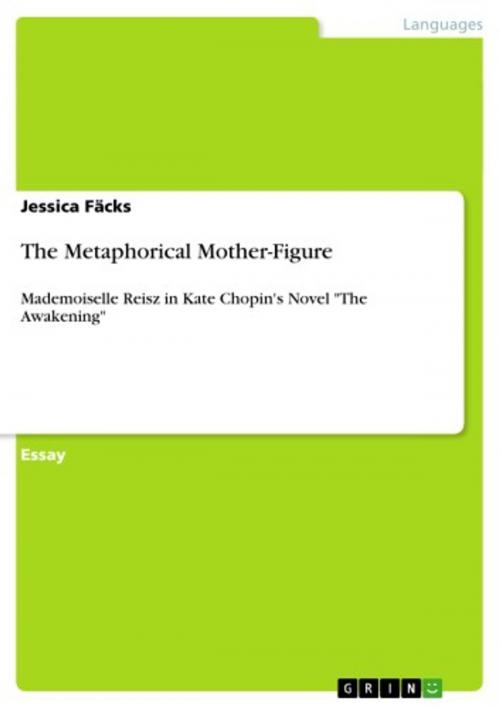The Metaphorical Mother-Figure
Mademoiselle Reisz in Kate Chopin's Novel 'The Awakening'
Fiction & Literature, Literary Theory & Criticism, British| Author: | Jessica Fäcks | ISBN: | 9783656125440 |
| Publisher: | GRIN Verlag | Publication: | February 9, 2012 |
| Imprint: | GRIN Verlag | Language: | English |
| Author: | Jessica Fäcks |
| ISBN: | 9783656125440 |
| Publisher: | GRIN Verlag |
| Publication: | February 9, 2012 |
| Imprint: | GRIN Verlag |
| Language: | English |
Essay from the year 2012 in the subject English - Literature, Works, grade: 1,0, Johannes Gutenberg University Mainz (Department of English and Linguistics), course: Introduction to Literary Studies, language: English, abstract: Much has been written about Mademoiselle Reisz (in the following abbreviated with Reisz), the independent pianist in Kate Chopin's novel The Awakening. Critics either interpreted her as Edna Pontellier's 'artistic role model' (Seidel, 'Painting' 231) or as a 'conjurer' (Giorcelli 137), who is 'always dressed in black' (Giorcelli 136) and therefore portrays a vivid contrast to Edna's feminine friend Adèle Ratignolle, who is 'always dressed in white' (Giorcelli 136). Although Reisz is a secondary character, who only ap¬pears in five chapters (Ch. IX, XVI, XX, XXI, XXX), the author nevertheless offers another aspect of her. In the following, this paper will show that Edna attempts to compensate the loss of her mother by replacing her with a metaphorical mother-figure whom she finds in Reisz. II.The Early Motherlessness of Edna Pontellier In order to understand Edna's motivation to find a mother-figure in Reisz, her child¬hood has to be reflected upon. Throughout the novel, the recipient is granted only little in¬formation about Edna's deceased mother, who remains nameless. Joyce Dyer points out that '[i]t is interesting that Chopin treats Edna's motherlessness so briefly and, appar¬ently, so casually. Edna's avoidance of the issue suggests how painful it is' (91-92). Cristina Giorcelli goes further by stating that '[d]eprived of a mother, Edna could not fully be a daughter' (118). Thus, it is, from a psychological approach, deducible that the 28 year old protagonist lacks an important step in her identification process. As Edna confesses to Adèle, she feels like walking 'idly, aimlessly, unthinking and unguided' (Chopin 38). The link between the lacking guidance and the absent mother is immediately set when the narrator continues to inform the recipient vaguely that Edna became a half-orphan when she was 'quite young' (Chopin 38). Presumably, she is neither able to remember how old she was when her mother died nor is she able to recall any memories of her, either intentionally or unintentionally.
Essay from the year 2012 in the subject English - Literature, Works, grade: 1,0, Johannes Gutenberg University Mainz (Department of English and Linguistics), course: Introduction to Literary Studies, language: English, abstract: Much has been written about Mademoiselle Reisz (in the following abbreviated with Reisz), the independent pianist in Kate Chopin's novel The Awakening. Critics either interpreted her as Edna Pontellier's 'artistic role model' (Seidel, 'Painting' 231) or as a 'conjurer' (Giorcelli 137), who is 'always dressed in black' (Giorcelli 136) and therefore portrays a vivid contrast to Edna's feminine friend Adèle Ratignolle, who is 'always dressed in white' (Giorcelli 136). Although Reisz is a secondary character, who only ap¬pears in five chapters (Ch. IX, XVI, XX, XXI, XXX), the author nevertheless offers another aspect of her. In the following, this paper will show that Edna attempts to compensate the loss of her mother by replacing her with a metaphorical mother-figure whom she finds in Reisz. II.The Early Motherlessness of Edna Pontellier In order to understand Edna's motivation to find a mother-figure in Reisz, her child¬hood has to be reflected upon. Throughout the novel, the recipient is granted only little in¬formation about Edna's deceased mother, who remains nameless. Joyce Dyer points out that '[i]t is interesting that Chopin treats Edna's motherlessness so briefly and, appar¬ently, so casually. Edna's avoidance of the issue suggests how painful it is' (91-92). Cristina Giorcelli goes further by stating that '[d]eprived of a mother, Edna could not fully be a daughter' (118). Thus, it is, from a psychological approach, deducible that the 28 year old protagonist lacks an important step in her identification process. As Edna confesses to Adèle, she feels like walking 'idly, aimlessly, unthinking and unguided' (Chopin 38). The link between the lacking guidance and the absent mother is immediately set when the narrator continues to inform the recipient vaguely that Edna became a half-orphan when she was 'quite young' (Chopin 38). Presumably, she is neither able to remember how old she was when her mother died nor is she able to recall any memories of her, either intentionally or unintentionally.















